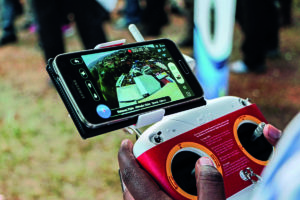
August 4, 2018//-The Fourth Industrial Revolution, or Industry 4.0 if you will, is here.
Buzzwords such as blockchain, artificial intelligence and robotics are smart technologies changing the face of industrial processes and production globally. The question is, how are African countries positioning themselves to harness the opportunities and benefits of acquiring and adapting new technologies into their production processes?
Rwanda understands the urgency and speed of this technological age, and that the only path to industrial growth is through development and integration of science, technology and innovation into enterprises. This is evidenced in Rwanda’s Vision 2050 and the Seven Year Government Programme (2017-24), both national frameworks that aim to establish Rwanda as a globally competitive knowledge-based economy and create 214,000 decent jobs annually.
Made in Rwanda campaign
The Made in Rwanda campaign was set up in 2014 and spearheaded by key stakeholders such as the Rwanda Development Board, the Rwanda Private Sector Federation and the Ministry of Trade and Industry. This initiative is to essentially reduce the country’s trade deficit and promote consumption of locally produced goods and services.
This was the first of several strategies to stimulate the domestic market and address issues faced by small and medium enterprises (SMEs), which make up 98% of businesses in the country.
Rwanda’s formal trade deficit was reduced by 21.7% in 2017, partly due to of strategies such as the Made in Rwanda Campaign.
The campaign has boosted various industries in Rwanda, especially in the garment sector. Nonetheless, there is still a challenging journey ahead if we are to grow local industries and make them competitive.
Key industry players in Rwanda are primarily engaged in the production and processing of wood, tobacco, cement, textiles, agro processing, small scale beverages, soap, furniture, shoes, plastic goods, tea and coffee. Others include chemicals, construction, printing, engineering and methane gas.
Among such challenges, many have cited Rwanda’s land-locked geographical position; a small private sector; and lack of innovation, amongst other things. However, all this can be changed by smart technologies that drive industries forward as the country positions itself as a regional ICT Hub.
The most obvious solution is to infuse modern technologies into enterprises to boost Rwandan industrial growth.
Integrating smart technologies
Aware of the low levels of acquisition and adaptation of technology by Rwandan industrial firms, government and the private sector have embarked on the first of many interventions aimed at boosting competitiveness.
For instance, the National Industrial Research and Development Agency (NIRDA), will support the acquisition and adaptation of technology for firms through thorough audit systems, and thus reduce the cost of adoption.
The 2018 NIRDA Open Calls Programme aims to equip selected enterprises with technological skills that will increase productivity using appropriate technology.
It goes without saying that such an approach is not doable without having government agencies serve the private sector directly, providing training and encouraging innovation.
The future of work lies in how well we train young innovators to design, prototype and most importantly, dream. What better way is there to create sustainable frameworks than by training talented youth as future custodians of smart technologies not only in Rwanda, but across the continent? Fears of “robots replacing humans”, misplaced or accurate, have been expressed globally with the common perception of a “jobless future”.
Disruptive technologies have always brought with them both positive and negative effects. McKinsey’s 2017 report on automation estimates that high percentages of jobs in African countries will be automated – 52% in Kenya, 46% in Nigeria and 50% in Ethiopia.
Industry 4.0 does not only lead to job losses due to automation, it also creates unprecedented opportunities for our youth to move into new types of jobs based on problem-solving, creativity and innovation. We need to prepare our youth for those opportunities.
Urgent business
The common thread running through Rwanda’s focus on reducing its trade deficit and diversifying its export base is to use smart technologies to develop its nascent industries. This approach is the future, as today’s socio-economic fabric is interwoven with technology.
It is urgent that we understand and leverage early adoption of new technologies to increase industrialisation, not forgetting that they must be affordable, sustainable and environmentally friendly. The quicker we do this, the faster Rwanda’s vision of becoming a knowledge-based economy will happen.
By Kampeta Sayinzoga, director general of Rwanda’s National Industrial Research and Development Agency (NIRDA)
This article was originally by africanbusinessmagazine.com.


